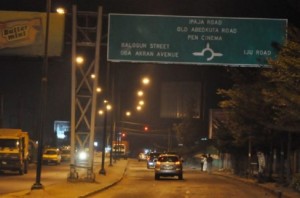
Agege; Lagos suburb with vast market areas, a huge population, and a busy rail line. Agege never really sleeps. Until 2006, Pen Cinema in Agege was one of the most famous landmarks in the Lagos metropolis. To many, the cinema was synonymous with the Agege area, the reason for which, the area and its biggest bus station was called Pen Cinema. Though the area is still referred to as Pen Cinema, the film complex is already history. The site on which it stood is now home to an outlet of a fast food chain[i]. Presence of the stately buildings, beginning from year 2000 brought the advantage of added security measures for residents. Before this time, residents lived in fear of armed robbers and there was a Voluntary Police Service put in place to complement the efforts of the police. The citing of some of the structures on Olufeso Street invited the ambience which in turn attracted other infrastructural development in the area.
Olufeso Street, in the Iloro area of Agege was the breath of fresh air. Bordered by Sanusi, Humani and Adetona streets, Olufeso is one which seems to have it all, with a Divisional Police Station and the Henry Carr Public Library sitting at its entrance. The intimidating structure of the Brightfield College, a private school on the street, and its smooth tarred road, without the misfortune of a pothole, are a precursor of better things to come. Further down the street are storey buildings built to modern finesse and styles. However, the real pudding is served towards the tail end of the street, where ultra-modern terrace houses with careful finishing almost meet the sky. The cluster of houses, which are in various degrees of completion, are dainty and reminiscent of what is found in the Lekki and the Victoria Island areas of the state. Religious places such as the Misbaudeen Islamic Centre and Destiny Revival Church are also part of the visage. Branching off the street is the Oba Lateef Adams Estate, a community where the middle class and the rich call home. An area office of the Agege Local Government, a Primary Health Centre, as well as the Abibatu Mogaji Millennium Secondary School complete the picture. Olufeso is in a class of its own as the only street in the area that is home to some of the important destinations around. Yet more beautiful is the Oba Lateef Adams Estate.
Unlike what used to be known about the area, human and vehicular traffic is light. But the picturesque scene has become a usual sight for most residents and pupils of the Abibatu Mogaji Millennium School and its neighbouring Agege Junior High School. Transformation of the street started in 2008 when members of the ruling house in the Iloro community sold portions of land to some wealthy people, with the development leading to an increase by up to 700 percent in the cost of land.
While Iloro is gradually wearing a new look, many communities in the larger Agege area are, however, yet to shed their skin. With a large number of ramshackle house and makeshift shops, crime is often not far behind in many parts of it. A 2005 survey, authored by Etannibi Alemik and Innocent Chukwuma for the CLEEN Foundation describes Agege as a hub with higher levels of robbery and pick-pocketing. The survey, entitled, “Criminal victimisation and fear of crime in Lagos metropolis, Nigeria, identifies Agege, Apapa, Oshodi-Isolo and Ajeromi-Ifelodun LGAs with greater incidence of bag snatching and pick pocketing. Home breaking or burglary was reported as a crim common in Agege, Oshodi-Isolo and Lagos Island. This form of crime is more common in the residential areas of low-income earners with high multiple household occupancy in single rooms and two-room apartment poorly served with public utilities such as electricity. However, some sections of the popular area have given way to exotic estates over the years. They include the Sunshine Estate, Maple Wood Estate, County Estate arlately, Bola Tinubu Royal Garden Estate. In spite of a sprinkle of modern estates whose steep prices make it impossible for the lower class to own, most of the entrails of Agege communities are still close to the status of a slum. It is not unusual to find nouvea rich and impoverished houses separated only by a few inches. On many streets, old houses, in dire need of paint and renovation works are attached with two or more shops[ii].
Odejobi Street situated along the Agege- Iju Ishaga Road and Agege- Abule Egba Road, and all the adjoining streets in the area around Pen-Cinema, Agege, were some of the areas in Lagos that were submerged by flood in the Sunday, July 10, 2011 flooding. Some houses on the street were submerged by flood for a whole week and residents had to use pumping machines to bail water from their compounds. Following this incidence, the Lagos State government demolished all the houses on one side of the street[iii].
[i] The News May 7, 2007
[ii] Punch May 19, 2015
[iii] Newswatch October 17, 2011





















